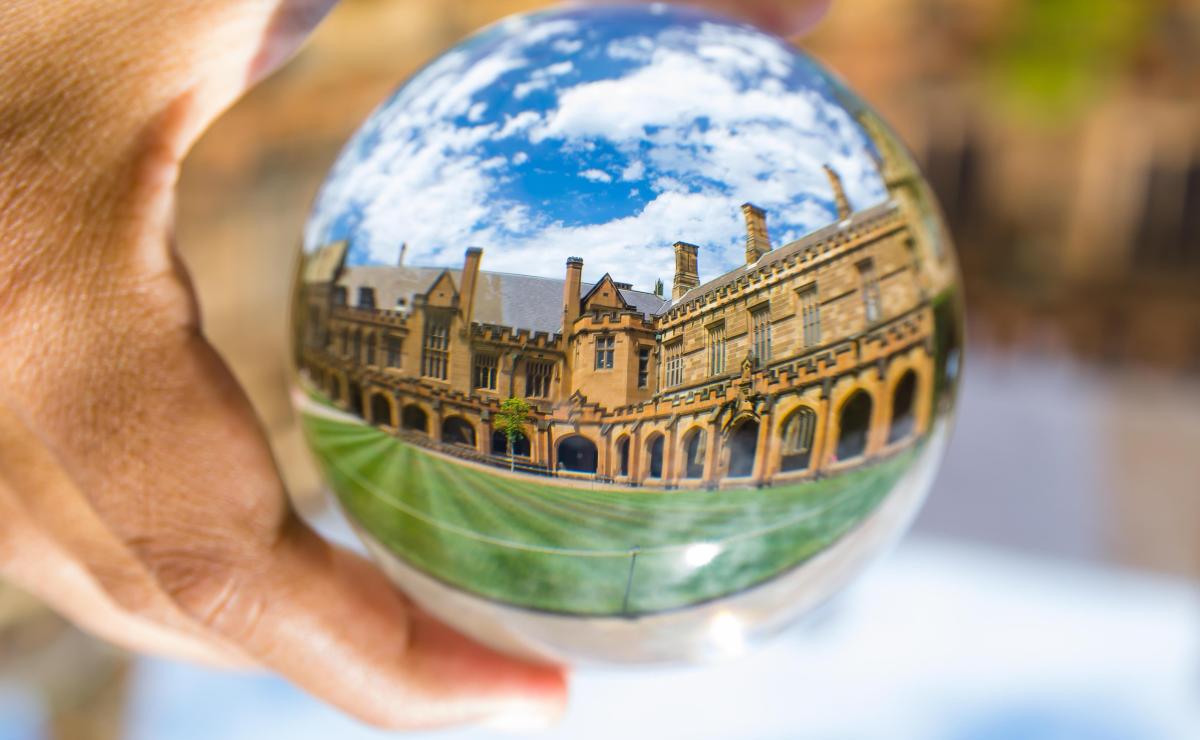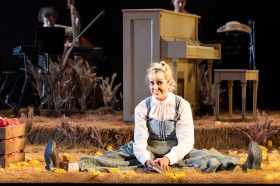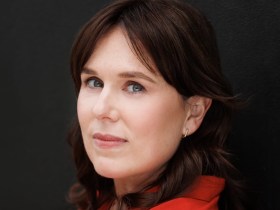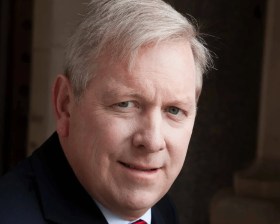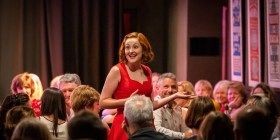The arts and university sectors have a lot in common: we share people (hello, I’m a playwright) but we also train you up and we welcome you back for further study when you want to do a beautiful, obsessive deep dive into your practice and research your artform. We love that. We often commission you (Born In A Taxi are in residence with us this year and making incredible work) or we place our students as interns within your work (yes, we provided your last three assistant stage managers, four assistant directors and loaned you that projector). But, most importantly, we are shared victims of pervasive myths that question our worth – and these myths are now having a devastating impact.
So here’s what I will do (consider this your abstract because, well, I am also a university lecturer and love a good abstract): I am going to tell you about one of these myths and break it apart in both quantifiable and unquantifiable ways. Then I am going to tell you what is happening to us and suggest ways you can help. But first, I’m going to talk about Hugh Jackman.
If you teach theatre at a university, people will ask you who your ‘Hugh Jackman’ is. Do we at Monash Centre for Theatre and Performance have a Wolverine? Last year, a potential donor told us that we needed to commission an award-winning play because ‘Melbourne Uni has Summer of the Seventeenth Doll’. Never mind that The Doll was written 65 years ago in a very different arts climate or the numerous emerging and established writers we have supported over the years: the people want a Hugh Jackman. They want a Doll. Think of this as your ‘have you been in anything I would have heard of?’ question.
In the light of the renewed attacks on our sectors, and on humanities degrees in particular, it does make one ask: how do we show the value of a great arts education? How do we demonstrate our worth to the community?
I have been working at Monash University’s Centre for Theatre and Performance for five years now, first as producer/programmer, commissioning and producing new works, and now as an assistant lecturer. In both roles I have encountered myths about performing arts and education – myths about prestige, the worthiness of art and the career prospects for artists – that complicate the act of evaluation. Today I want to talk about this one:
Arts Degrees don’t lead to jobs
Here’s the quantifiable breakdown: Monash Arts Faculty has an 88% graduate employment rate but this does not stop politicians more than doubling the fees of humanities degrees whilst slashing the fees of the ‘job-relevant’ courses. Additionally, the Quality Indictors for Learning and Teaching (QILT) Graduate survey in 2019 found that not only were humanities graduates comparable to STEM graduates in terms of employability but they were among the most satisfied student group in terms of the quality of their degree, the teaching they received and their confidence in the skills they gained.
So let’s talk about the word ‘job’ and its companion word: ‘career’. Because yes, I agree that we are not training our students for a job – this isn’t dentistry with one single destination – humanities degrees are about careers in all their multifaceted, shifting complexity. I’m using the plural ‘careers’ because a 2015 report by the Foundation for Young Australians found that on average young people today will have 17 jobs and five careers over the course of their working lives. To teach in a humanities degree is to look at a room brimming with brilliance, creativity and passion and think, ‘I wonder where they will go? What they will do?’
For artists, these careers blur together even more, running concurrently (like my own dual roles as playwright and educator). The report found that nearly 60% of Australian students were training for jobs that may not exist in the near future and that, instead of aiming for that dream job, young people should think about ‘dream clusters’ and build skills that are transferable through an evolving world of work. Skills that you learn in humanities degrees and working as an artist: critical analysis, leadership, creative problem solving, political and social awareness, communication skills and emotional intelligence.
This is the ‘unquantifiable’ bit.
When I was producer/programmer at the Centre I commissioned works for a kindergarten, for vision-impaired audiences and at a nursing home. I hate the myth of prestige and wanted to show our students the value of making something special for one tiny group of people.
Read: Fee cuts for nursing and teaching but hikes for humanities in new uni package
In one of the nursing home pieces, verbatim theatre created by Penelope Bartlau (Barking Spider Visual Theatre) with third year students, the students performed to residents, many of whom did not remember that they had met and been interviewed by the cast before. When one woman’s story was told and she heard her own words – ‘I grew up in Carnegie’ – she exclaimed in surprise ‘That’s where I grew up!’ This show was seen by barely anyone in that initial performance and the residents most likely forgot it quickly but I will not forget the sight of my students after the performance, each sitting or kneeling in front of a glowing resident, holding their hands and quietly listening as the residents told them the same stories from their lives that our students had just performed to them.
How do we quantify this? Without a Hugh Jackman, we could measure the students who became regular volunteers at that nursing home. Or we could look at the students (now graduates) who are moving into careers in applied theatre or researching the benefits of community storytelling as a result of this one tiny performance, such as Jesse Rani and Paris Balla. Or do we look at the ways Penelope added this work to her remarkable portfolio, and guess at which grant applications it helped? Do we look at how we commissioned her again two years later and that work was taken to China, to Wuzhen Theatre Festival and presented alongside works created by the likes of The Berliner Ensemble? Do we look for the prestige or do we look at the intangible, transferable skills and the empathy the students gained in creating this work? Do we look for the Hugh Jackman or do we hold onto the image of the students kneeling before the residents of this dementia ward who, in that moment, felt seen and were listened to?
Just as the value of a piece of theatre is hard to quantify and box office sales and prestigious venues do not speak to the worth of the art, so too is a great arts education more than grades or numbers: it is about the impact on individuals. It is about how the person who walked in is different to the one walking out at the end of the show. At the end of the degree.
The bigger picture of university funding cuts
So this is what is happening. Firstly, systematic attacks on the university sector have been going on for a long time. The Turnbull Government ended demand driven domestic funding, which had a major impact on domestic undergraduate degrees and forced universities to become financially wedded to international students. COVID-19 sent them home. Just as they did with the arts sector, the Morrison Government did not make JobKeeper available to universities, despite being responsible for creating this obvious vulnerability. Many universities, including RMIT and La Trobe, have already cut hundreds of jobs. Monash is currently voting on a jobs protection framework to avoid that outcome: best-case scenario, this will reduce job losses to 227 FTE for now. Best-case. For now.
And then, into all this, came the announcement of these fee rises. Rises that will keep students out of humanities courses and that devalue a humanities education, once again feeding into that myth that arts degrees don’t lead to jobs. Honestly, it breaks my heart. I lie awake at night and worry about my job but, more than this, I worry about the students who won’t get the opportunity of a great education in the broad and multifaceted areas they are passionate about. As Zoё Coombs Marr tweeted after the announcement: ‘Arts are a lifeline and one of the most accessible entry points to uni and employment.’
So this is what you can do:
- Call the Hon Dan Tehan’s office. The best number is +61 (02) 6277 7350. It takes 30 seconds to say that you think the choice to raise the fees on humanities degrees by 113% is appalling. If you want to take another 30 seconds, tell them about your degree and the skills you are still using today.
- Broadcast your degree through #myartsdegree. Tweet at your former place of study (and Dan Tehan) and let them know what value you see in an arts education and all the beautiful, creative ways you have built upon it.
- Contact Prime Minister Scott Morrison about the lack of JobKeeper for both the arts and university sector. Let them know that their jobs-focused rhetoric isn’t fooling anyone: arts and tertiary jobs are real jobs and they are the heart of our country.

